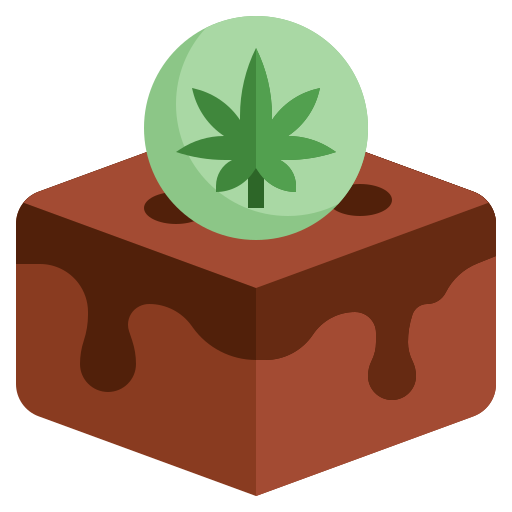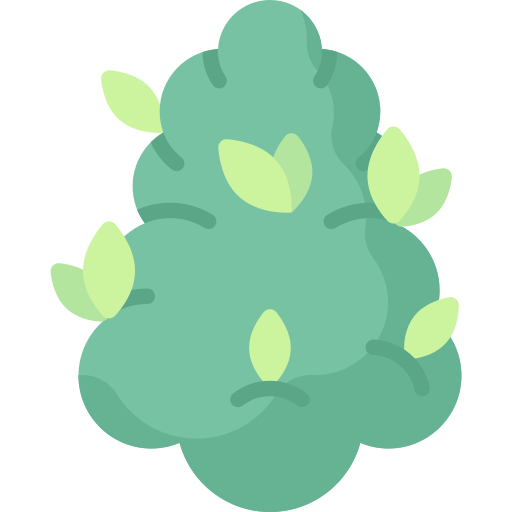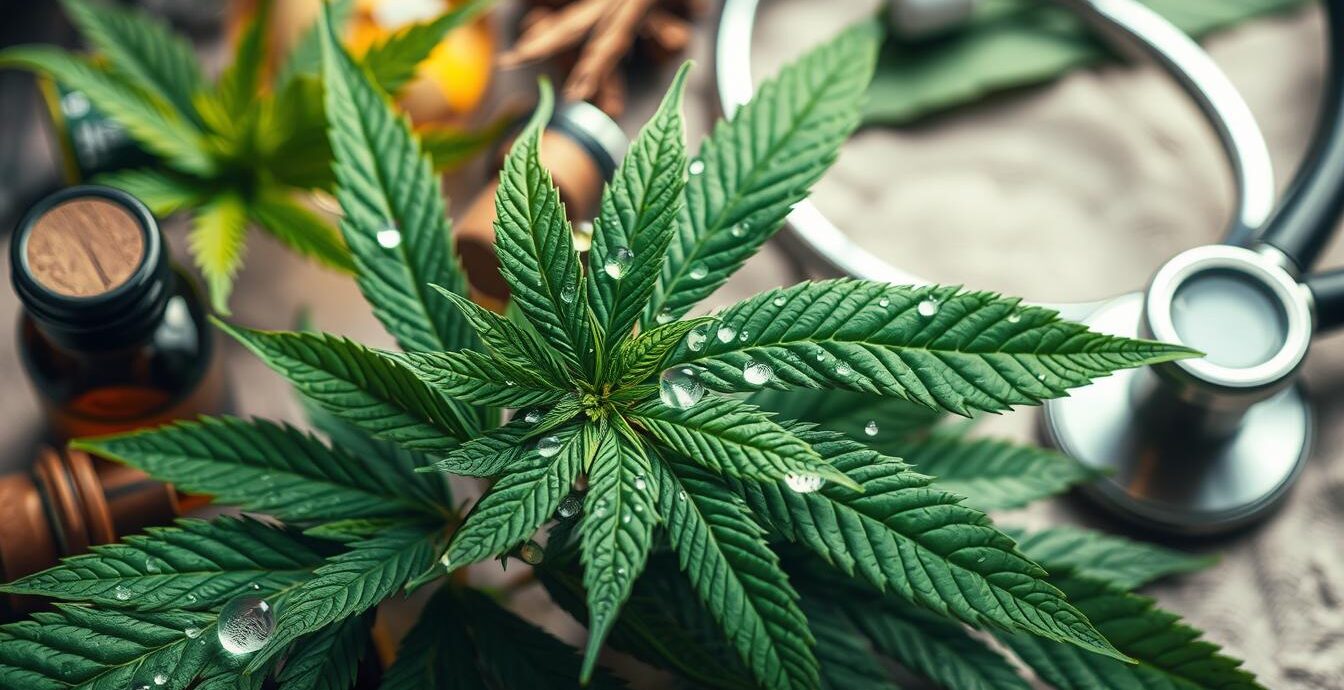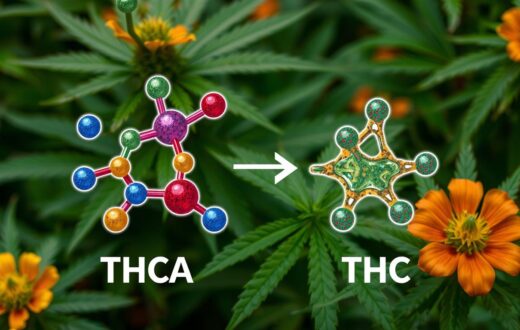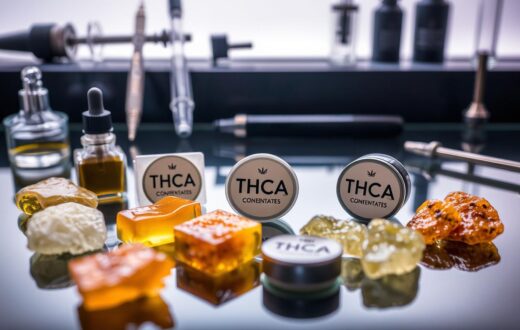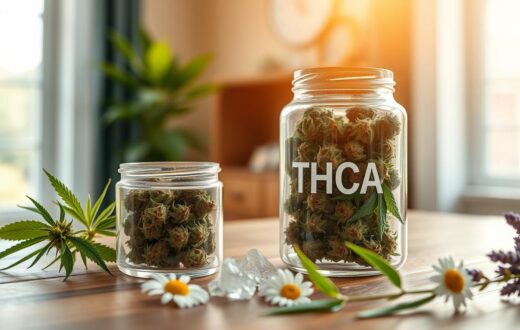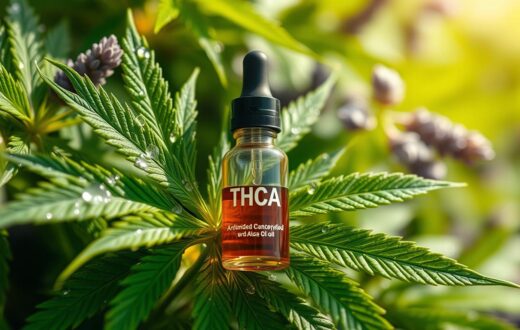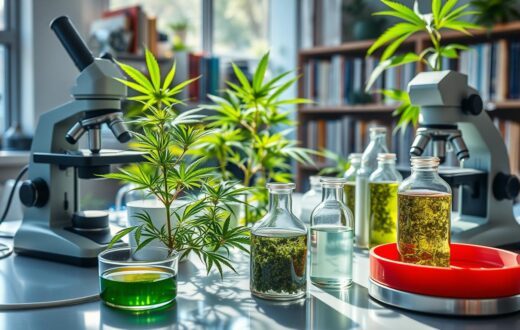Ever thought about the hidden side of cannabis? THCA is a compound that’s making waves. It’s a non-intoxicating version of THC, known for its health benefits. But what can it do for you?
THCA, short for tetrahydrocannabinolic acid, is found in fresh cannabis plants. It doesn’t make you high like THC does. But it’s getting attention for its health benefits, like fighting inflammation and easing nausea.
Let’s dive into THCA’s world. We’ll look at its unique properties and how it differs from THC. We’ll also explore the latest research and how it might help your health. This could change how you see plant-based wellness.
While THC has been studied a lot, THCA research is just starting. Early studies suggest it might help with inflammation, protect the brain, and reduce nausea. We need to be careful and cautious as we learn more about THCA.
Let’s explore the science and possibilities of THCA together. By the end, you’ll know more about its health benefits. Join us as we discover the world of THCA.
What is THCA?
THCA stands for tetrahydrocannabinolic acid, a key part of the cannabis world. It’s one of over 100 cannabinoids found in hemp and cannabis plants. Unlike THC, THCA won’t get you high. But it has its own special benefits.
Understanding Tetrahydrocannabinolic Acid
THCA is the raw, unheated form of THC. It’s found in fresh cannabis, especially in leaves and flowers. When you smoke or bake cannabis, heat turns THCA into THC. This change makes cannabis psychoactive.
How THCA Differs from THC
THCA doesn’t make you feel high. It’s non-psychoactive, unlike THC. But it’s not just a bystander. Research shows it might fight inflammation and ease nausea. It could even protect brain cells.
The Role of THCA in Cannabis
THCA is a big deal in the cannabis plant. It’s one of the most plentiful cannabinoids. As the plant grows, it produces THCA. This then turns into THC when heated.
But THCA isn’t just THC’s precursor. It’s gaining attention for its own health benefits. It might ease discomfort and support brain health. THCA is a cannabinoid worth watching.
The Science Behind THCA
Research on thc acids is uncovering their potential benefits for medical marijuana users. Scientists are studying how THCA, a non-psychoactive compound in raw cannabis, affects our bodies. Unlike THC, THCA doesn’t cause a “high” but shows promise in various therapeutic areas.
Research Studies on THCA
Recent studies have found exciting things about THCA. It has anti-inflammatory properties and may protect the brain. Some research suggests it could help manage nausea and control appetite.
These findings are leading to new medical marijuana treatments without the intoxicating effects of THC.
How THCA Interacts with the Endocannabinoid System
THCA interacts with our endocannabinoid system differently than THC. It doesn’t bind strongly to cannabinoid receptors, which is why it doesn’t cause a “high.” Instead, THCA may work through other pathways to offer its potential benefits.
This unique interaction opens up possibilities for patients who want to avoid the “high” from traditional cannabis use.
As research continues, we’re learning more about THCA’s potential in medical marijuana treatments. From pain relief to neuroprotection, the science behind THCA is showing promising avenues for future therapies. Stay tuned as we continue to uncover the full potential of this fascinating cannabinoid.
Anti-Inflammatory Properties of THCA
THCA, found in raw cannabis, is a natural remedy for inflammation. It shows promise in treating chronic inflammatory conditions. This is without the psychoactive effects of THC.
Potential Benefits for Chronic Inflammation
Studies show THCA may help with arthritis and lupus. Its anti-inflammatory properties make it a natural remedy option. Unlike THC, THCA doesn’t cause a “high,” making it good for daytime use.
THCA’s Interaction with the Immune System
THCA’s uses go beyond inflammation. It interacts with the immune system, possibly reducing inflammation. This makes it a focus for research in autoimmune and inflammatory diseases.
Early research suggests THCA is a valuable natural remedy for inflammation. As we learn more, THCA could play a big role in new treatments for chronic inflammation.
THCA and Pain Relief
Pain relief is a key part of wellness. THCA might help manage discomfort. Many people use cannabis for pain, and THCA is getting attention for its potential.
Anecdotal Reports of Pain Management
People who use raw cannabis or THCA products often share their stories. They say THCA helps ease pain without the high of THC. These stories are hopeful, but we need scientific proof.
Comparing THCA with Other Cannabinoids
THCA is different from THC and CBD. It doesn’t cause a high, which is good for daytime pain relief. Some say THCA works better for their pain than other options. But, we need more research to really understand its benefits.
As interest in THCA grows, so does the need for solid research. Clinical studies are key to confirming THCA’s pain-relieving qualities. For now, user stories and early research suggest THCA’s potential in pain relief.
THCA’s Neuroprotective Effects
Medical marijuana has more uses than just pain relief. Studies show that THCA, a part of raw cannabis, is good for brain health. It’s a non-psychoactive compound that protects the brain.
Research on THCA and Brain Health
Scientists are looking into how THCA affects the brain. A study in the National Library of Medicine found that THCA protects brain cells. This could lead to new ways to use medical marijuana for brain health.
Potential Impacts on Neurodegenerative Diseases
THCA might help with neurodegenerative diseases. A study on mice showed it could reduce Alzheimer’s proteins and improve memory. This means THCA could help with Parkinson’s and Alzheimer’s. As we learn more, THCA’s role in keeping the brain healthy becomes clearer.
THCA and Appetite Regulation
THCA is a non-psychoactive compound in raw cannabis. It plays a special role in controlling appetite. Unlike THC, THCA doesn’t cause a “high” but still has wellness benefits.
How THCA Affects Hunger Signals
THCA works with the body’s endocannabinoid system, especially the CB1 receptors in the brain. This interaction can make you hungry without the high of THC. For those with low appetite or chronic illnesses, THCA supplements might help.
A good starting dose is 5 to 10 mg daily. You can adjust this based on how you feel.
Implications for Weight Management
THCA’s ability to stimulate appetite is key for weight management. It helps cancer and HIV patients who often lose their appetite during treatment. THCA increases hunger and reduces nausea without making you high.
Clinical studies show it can improve appetite in sick patients. Its anti-inflammatory and neuroprotective effects make it a valuable tool in health care.
THCA for Nausea Relief
THCA, a compound in medical marijuana, shows promise for nausea relief. It’s especially helpful for patients going through tough treatments like chemotherapy.
Benefits for Patients Undergoing Treatment
THCA brings hope to those fighting treatment nausea. Studies show it might work better than THC for these symptoms. Users say they feel less sick and can keep food down.
Mechanisms of THCA’s Anti-Nausea Effects
Scientists are still learning how THCA fights nausea. They believe it works through the body’s endocannabinoid system. THCA interacts with specific receptors that control nausea and vomiting.
What’s exciting is that THCA might need lower doses than other options. This could mean fewer side effects for those using it for nausea relief.
As research goes on, THCA’s role in treating nausea looks promising. It offers a natural option for those seeking relief from treatment nausea. This adds to the growing list of uses for cannabis compounds.
Differences Between THCA and THC
THCA and THC are two cannabinoids found in cannabis plants. They have a similar structure but different effects on the body. THCA is found in raw cannabis and makes up half of the non-psychotropic content in most strains. THC, known for its intoxicating effects, is the well-known compound in marijuana.
Psychoactive Properties of THC
THC, or delta-9-tetrahydrocannabinol, is the main psychoactive part of cannabis. It connects to CB1 receptors in the brain, affecting memory, movement, and pain. This interaction causes the “high” from marijuana use.
THC can change how we see things, increase pleasure, and affect mood, appetite, and sleep.
When to Use THCA vs. THC Products
THCA products are great for those looking for health benefits without getting high. Some people add raw cannabis to foods like smoothies or salads for THCA’s benefits. THC products, like capsules, tinctures, and edibles, are used for pain relief and getting high.
It’s key to know that heating THCA at 230-250°F for 30-40 minutes turns it into THC. This happens naturally when you smoke or vape cannabis, with about 87.7% of THCA becoming THC.
Legal Status of THCA in the United States
The laws about THCA in the US are complex and change from state to state. The 2018 Farm Bill made THCA from hemp with less than 0.3% THC legal at the federal level. This allows people to explore its benefits for wellness. But, each state has its own rules, making things confusing.
Federal vs. State Regulations
Federal law says hemp-derived THCA is okay, but states have different rules. Some places like California, Florida, and Texas let THCA products. But, states like Idaho and Louisiana say it’s illegal. This makes it hard for people to find and use THCA across states.
Navigating the Legal Landscape
It’s important to know the laws in your area if you use THCA. For example, Texas lets people buy and use hemp-derived THCA with less than 0.3% THC. The state has over 7,700 shops selling hemp products, showing growing interest. But, there are talks about making the rules stricter. So, it’s key to keep up with your state’s laws to use THCA safely and legally.
How to Use THCA Products
THCA products are great for those looking for natural wellness solutions. They come in many forms, each with its own benefits and ways to use them. Let’s look at how you can add THCA to your wellness routine.
Methods of Consumption
Raw cannabis flower is full of THCA and can be eaten or juiced. This keeps THCA from becoming psychoactive. Tinctures let you control how much THCA you take. Topicals work on specific areas of your body.
For those who like to inhale, THCA crystals are perfect for dabbing. Transdermal patches give a steady dose through your skin.
Common Forms of THCA Available
There are many types of THCA products to meet different needs. Pre-rolls, like Mystic Labs THCA Pre-Rolls, have 1.25 grams of THCA-infused hemp flower. Disposable vape pens, such as Area 52’s, have 400 mg of THCA.
Koi CBD’s vape has a huge 5000 mg of cannabinoids, including THCA. If you’re new to THCA, start with small amounts. Be careful not to heat THCA too much, as it turns into THC.
Precautions When Using THCA
THCA is a compound in raw cannabis plants with health benefits. It’s generally safe but can have side effects and interactions. Medical marijuana users often choose THCA for its benefits, but they need to be careful.
Possible Side Effects
THCA users might feel a bit dizzy, have dry mouth, or slight nausea. They might also feel tired or sleepy. Some notice changes in appetite or blood pressure. Long-term use could affect memory and focus.
Interactions with Medications
THCA can change how some medications work. It’s important to talk to a doctor before using it, especially if you’re on other drugs. This is especially true for medical marijuana users to use it safely.
Remember, THCA becomes psychoactive when heated, turning into THC. This can make it hard to move or react quickly. Start with small amounts to see how you react. Buy THCA products from trusted sources that show lab test results. While THCA has benefits, it’s not for everyone, like pregnant women, kids, or people with certain health issues.
Future Research Directions on THCA
The world of cannabinoids is growing fast. Scientists are studying THCA, a non-psychoactive compound in raw cannabis. It’s getting attention for its special properties.
Emerging Studies and Findings
Recent studies show THCA might help with chronic pain and nausea. It could also protect the brain. This makes it interesting for treating brain diseases.
Potential Therapeutic Uses to Explore
Researchers want to know more about THCA’s effects on appetite and weight. They’re also looking into its ability to slow cancer cell growth. As cannabis use grows, we’ll see more human trials.
The cannabis plant has over 545 compounds, including 140 cannabinoids. Learning more about THCA and other cannabinoids could lead to new treatments. This field is full of possibilities for helping people with different health issues.
Conclusion
As we finish our look at THCA health benefits, it’s clear this compound has a lot to offer. It’s found in raw cannabis and could help with inflammation, protect the brain, and ease nausea.
Summarizing the Health Benefits of THCA
THCA is special because it doesn’t get you high like THC does. This makes it great for people looking for health benefits without the psychoactive effects. Studies show it might boost appetite, manage pain, and even slow cancer growth.
Considerations for Future Use
Even though THCA looks promising, we need to be careful with it. The laws about it vary by place. Always talk to a doctor before using THCA, especially if you’re on other meds. As we learn more, we’ll see how THCA can improve our health and happiness.

